In a groundbreaking study published in BMC Cancer, researchers have unveiled intricate differences in the immune microenvironment of colorectal cancer (CRC) associated with various KRAS gene mutation subtypes. This comprehensive analysis sheds light on the complex interplay between immune cells within tumors, offering promising new avenues for targeted immunotherapy in CRC, a leading cause of cancer mortality worldwide.
Colorectal cancer’s molecular heterogeneity has long posed challenges for effective treatment, with KRAS mutations playing a pivotal role in tumor progression and therapeutic resistance. The KRAS gene, a key regulator of cell signaling pathways, undergoes mutations that not only influence tumor growth but also shape the surrounding immune landscape. Until now, the relationship between specific KRAS mutation subtypes and the tumor immune environment remained poorly understood.
The study focused on 55 colorectal cancer patients, meticulously characterizing the spatial distribution of key immune cells within tumor tissues. Employing advanced immunohistochemistry techniques alongside panoramic scanning, the research team mapped out the presence and localization of CD8+ T cells, CD4+ T cells, natural killer (NK) cells, B cells, and macrophage subsets. This approach enabled a high-resolution view of immune infiltration patterns relative to KRAS mutation status.
.adsslot_aLTEPOnJYr{ width:728px !important; height:90px !important; }
@media (max-width:1199px) { .adsslot_aLTEPOnJYr{ width:468px !important; height:60px !important; } }
@media (max-width:767px) { .adsslot_aLTEPOnJYr{ width:320px !important; height:50px !important; } }
ADVERTISEMENT
A striking finding emerged around the tumor invasion front, a critical region where cancer cells interact with normal tissue. Researchers noted that immune cell infiltration differed markedly at this boundary between tumors with distinct KRAS mutations. Most notably, FOXP3+ regulatory T cells and M2 macrophages demonstrated variable abundance and distribution, suggesting these cells play pivotal roles in modulating immune responses influenced by KRAS subtypes.
FOXP3+ regulatory T cells are known for their immunosuppressive functions, often enabling tumor cells to evade immune detection. Meanwhile, M2 macrophages generally contribute to tumor-promoting inflammation and tissue remodeling. The study’s revelation that these cell types differ between KRAS wild-type and mutant tumors underscores the nuanced immune evasion strategies tumors may employ depending on their genetic alterations.
Importantly, the researchers correlated the immune profiles with clinical outcomes, highlighting that the densities of FOXP3+ T cells and M2 macrophages are strongly associated with patient prognosis. This finding positions these immune subsets as potential biomarkers for predicting disease progression and therapeutic responsiveness in CRC patients harboring different KRAS mutations.
To deepen their analysis, the team utilized large-scale genomic databases such as The Cancer Genome Atlas (TCGA) and protein interaction networks from the STRING database. These bioinformatic tools affirmed the observed experimental patterns, illustrating molecular pathways through which KRAS mutations could influence recruitment and function of specific immune cells within the tumor microenvironment.
The intricate immune landscape revealed by the study transcends simplistic models that consider only single immune cell populations. Instead, the researchers advocate for a holistic understanding of the tumor microenvironment as a dynamic ecosystem where cellular interactions and proportions dictate immune contexture and, ultimately, patient outcomes.
This nuanced view suggests that therapeutic strategies targeting CRC must account for the multifaceted immune alterations driven by KRAS mutation subtypes. Treatments selectively modulating FOXP3+ regulatory T cell activity or reprogramming M2 macrophages towards an anti-tumor M1 phenotype could enhance the efficacy of existing immunotherapies.
Furthermore, the research underscores the importance of spatial heterogeneity within tumors. The differential immune cell infiltration at the invasion front hints that localized immune modulation might be necessary to overcome tumor immune resistance, especially in aggressive KRAS-mutant colorectal cancers.
Such insights pave the way for precision medicine approaches that integrate genetic profiling with immune phenotyping. Tailoring immunotherapeutic interventions to the specific KRAS mutation and immune microenvironment composition holds the promise of improving patient survival and reducing therapy resistance.
Beyond immediate clinical implications, this study contributes fundamentally to our understanding of how oncogenic mutations shape the tumor-immune dialogue. It opens new questions on the mechanistic pathways driving immune cell recruitment and phenotypic shifts in the context of KRAS mutations, providing fertile ground for future research.
The use of state-of-the-art immunohistochemical spatial profiling combined with big data analyses exemplifies the power of interdisciplinary methods in unraveling cancer biology’s complexity. This study sets a new standard for investigating tumor-immune interactions in genetically heterogeneous cancers.
As immunotherapy continues to revolutionize oncology, studies like this highlight the necessity to dissect the immune microenvironment at a granular level. Only by appreciating the subtle but impactful differences across tumor genotypes can novel, effective therapies be devised.
In summary, by elucidating how different KRAS gene subtypes sculpt the immune milieu in colorectal cancer, this research marks a significant leap toward personalized cancer immunotherapy. It calls for integrated clinical and molecular strategies that harness immune cell dynamics for improved management of colorectal cancer patients.
Subject of Research: The study investigates the variations in the immune microenvironment of colorectal cancer associated with different KRAS gene mutation subtypes.
Article Title: Analysis of the immune microenvironment in colorectal cancer with different KRAS gene subtypes.
Article References:
Huang, J., Gong, Q., Li, Q. et al. Analysis of the immune microenvironment in colorectal cancer with different KRAS gene subtypes.
BMC Cancer 25, 1267 (2025). https://doi.org/10.1186/s12885-025-14660-5
Image Credits: Scienmag.com
DOI: https://doi.org/10.1186/s12885-025-14660-5
Tags: advanced immunohistochemistry techniquesCD8+ T cells in tumorscolorectal cancer and immune responsecolorectal cancer immune landscapeimmune microenvironment in colorectal cancerKRAS gene mutation subtypesmolecular heterogeneity in colorectal cancerrole of tumor invasion front in CRCspatial distribution of immune cellstargeted immunotherapy for CRCtherapeutic resistance in KRAS-mutant CRCtumor immune cell infiltration patterns





